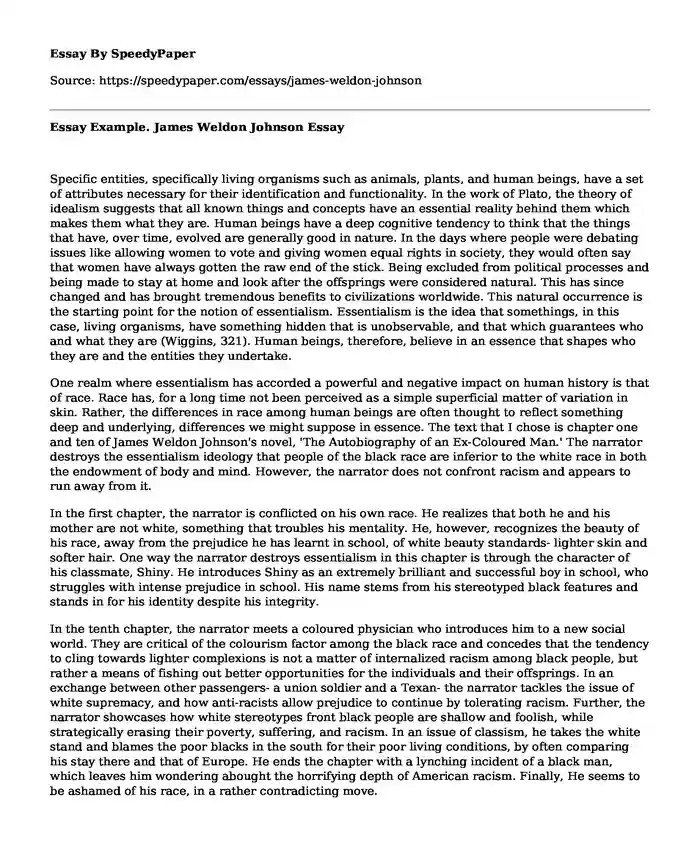
| Essay type: | Book review |
| Categories: | Racism Philosophy Social issue Books |
| Pages: | 3 |
| Wordcount: | 758 words |
Specific entities, specifically living organisms such as animals, plants, and human beings, have a set of attributes necessary for their identification and functionality. In the work of Plato, the theory of idealism suggests that all known things and concepts have an essential reality behind them which makes them what they are. Human beings have a deep cognitive tendency to think that the things that have, over time, evolved are generally good in nature. In the days where people were debating issues like allowing women to vote and giving women equal rights in society, they would often say that women have always gotten the raw end of the stick. Being excluded from political processes and being made to stay at home and look after the offsprings were considered natural. This has since changed and has brought tremendous benefits to civilizations worldwide. This natural occurrence is the starting point for the notion of essentialism. Essentialism is the idea that somethings, in this case, living organisms, have something hidden that is unobservable, and that which guarantees who and what they are (Wiggins, 321). Human beings, therefore, believe in an essence that shapes who they are and the entities they undertake.
One realm where essentialism has accorded a powerful and negative impact on human history is that of race. Race has, for a long time not been perceived as a simple superficial matter of variation in skin. Rather, the differences in race among human beings are often thought to reflect something deep and underlying, differences we might suppose in essence. The text that I chose is chapter one and ten of James Weldon Johnson's novel, 'The Autobiography of an Ex-Coloured Man.' The narrator destroys the essentialism ideology that people of the black race are inferior to the white race in both the endowment of body and mind. However, the narrator does not confront racism and appears to run away from it.
In the first chapter, the narrator is conflicted on his own race. He realizes that both he and his mother are not white, something that troubles his mentality. He, however, recognizes the beauty of his race, away from the prejudice he has learnt in school, of white beauty standards- lighter skin and softer hair. One way the narrator destroys essentialism in this chapter is through the character of his classmate, Shiny. He introduces Shiny as an extremely brilliant and successful boy in school, who struggles with intense prejudice in school. His name stems from his stereotyped black features and stands in for his identity despite his integrity.
In the tenth chapter, the narrator meets a coloured physician who introduces him to a new social world. They are critical of the colourism factor among the black race and concedes that the tendency to cling towards lighter complexions is not a matter of internalized racism among black people, but rather a means of fishing out better opportunities for the individuals and their offsprings. In an exchange between other passengers- a union soldier and a Texan- the narrator tackles the issue of white supremacy, and how anti-racists allow prejudice to continue by tolerating racism. Further, the narrator showcases how white stereotypes front black people are shallow and foolish, while strategically erasing their poverty, suffering, and racism. In an issue of classism, he takes the white stand and blames the poor blacks in the south for their poor living conditions, by often comparing his stay there and that of Europe. He ends the chapter with a lynching incident of a black man, which leaves him wondering abought the horrifying depth of American racism. Finally, He seems to be ashamed of his race, in a rather contradicting move.
Human beings are constantly sorting objects, thoughts, emotions, other people and even themselves into groups which inform and determine our thoughts and behaviors. While we do not share the same system of categorization, I believe that in a modern and post-modern era, it is important for people to be judged in accordance to merit and not according to identity-based essentialism. In order to understand one's beliefs and traditions, it is vital to know as much information about a particular individual, rather than that of a group or category. By doing so, we will evade the social and political controversy that mar our collective civilization as human beings going forward.
Works Cited
Johnson, James Weldon. The Autobiography of an Ex-Colored Man. Project Gutenberg. Chapter 1 & 10. 2004.
Wiggins, David. “Essentialism, Continuity, and Identity.” Synthese, vol. 28, no. 3/4, 1974, pp. 321–359. JSTOR, www.jstor.org/stable/20114975. Accessed 6 Aug. 2020.
Cite this page
Essay Example. James Weldon Johnson. (2023, Nov 03). Retrieved from https://speedypaper.net/essays/james-weldon-johnson
Request Removal
If you are the original author of this essay and no longer wish to have it published on the SpeedyPaper website, please click below to request its removal:
- The Theory of Law by Helvetius, Free Essay in Philosophy
- Essay Example Describing the Role of Women in Frankenstein Society
- Helping Victims of Human Trafficking - Paper Sample
- Essay Sample on Development and Ethical Issues in Quantum Mechanics
- Socrates: No One Does Evil Intentionally. Free Essay
- Essay Sample on Ludwig Wittgenstein's Philosophy
- Brief History of the Life and Works of Francis Scott Key Fitzgerald - Free Essay
Popular categories




